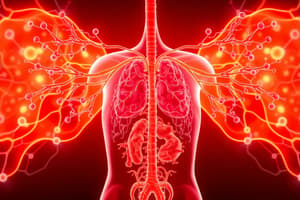Podcast
Questions and Answers
Which endocrine gland is responsible for producing hormones that regulate stress response, electrolyte balance, and blood pressure?
Which endocrine gland is responsible for producing hormones that regulate stress response, electrolyte balance, and blood pressure?
- Adrenal Glands (correct)
- Hypothalamus
- Pituitary Gland
- Thyroid Gland
What type of hormone is insulin, which regulates blood sugar levels?
What type of hormone is insulin, which regulates blood sugar levels?
- Peptide Hormone (correct)
- Protein Hormone
- Steroid Hormone
- Amine Hormone
Which mechanism involves the effect of a hormone inhibiting its own production, maintaining homeostasis?
Which mechanism involves the effect of a hormone inhibiting its own production, maintaining homeostasis?
- Hormone Regulation
- Negative Feedback (correct)
- Positive Feedback
- Endocrine Response
Which region in the brain regulates body temperature, hunger, and thirst, and produces hormones that stimulate or inhibit hormone production in other glands?
Which region in the brain regulates body temperature, hunger, and thirst, and produces hormones that stimulate or inhibit hormone production in other glands?
What is the term for the network of glands and organs that produce and regulate hormones in the body?
What is the term for the network of glands and organs that produce and regulate hormones in the body?
Which hormone is produced by the thyroid gland and regulates metabolism and growth?
Which hormone is produced by the thyroid gland and regulates metabolism and growth?
What is the term for the underproduction of thyroid hormones, leading to decreased metabolism and growth?
What is the term for the underproduction of thyroid hormones, leading to decreased metabolism and growth?
Which type of hormone is derived from cholesterol and includes sex hormones and adrenal hormones?
Which type of hormone is derived from cholesterol and includes sex hormones and adrenal hormones?
Flashcards are hidden until you start studying
Study Notes
Overview of Endocrine Physiology
- The endocrine system is a network of glands and organs that produce and regulate hormones in the body.
- Hormones are chemical messengers that control various bodily functions, such as growth and development, metabolism, and reproductive processes.
Major Endocrine Glands
- Pituitary Gland: often referred to as the "master gland" because it regulates other endocrine glands; produces hormones that stimulate or inhibit hormone production in other glands.
- Thyroid Gland: produces thyroxine (T4) and triiodothyronine (T3), which regulate metabolism and growth.
- Adrenal Glands: produce hormones such as cortisol, aldosterone, and adrenaline, which regulate stress response, electrolyte balance, and blood pressure.
- Pancreas: produces insulin and glucagon, which regulate blood sugar levels.
- Ovaries and Testes: produce sex hormones, such as estrogen and testosterone, which regulate reproductive processes.
- Hypothalamus: a region in the brain that regulates body temperature, hunger, and thirst, and produces hormones that stimulate or inhibit hormone production in other glands.
Hormone Regulation
- Negative Feedback: a mechanism where the effect of a hormone inhibits its own production, maintaining homeostasis.
- Positive Feedback: a mechanism where the effect of a hormone stimulates its own production, often leading to a rapid response.
Types of Hormones
- Steroid Hormones: derived from cholesterol, these hormones include sex hormones and adrenal hormones.
- Peptide Hormones: composed of amino acids, these hormones include insulin, growth hormone, and thyroid-stimulating hormone.
- Amine Hormones: derived from amino acids, these hormones include epinephrine and norepinephrine.
Endocrine Disorders
- Hypothyroidism: underproduction of thyroid hormones, leading to decreased metabolism and growth.
- Hyperthyroidism: overproduction of thyroid hormones, leading to increased metabolism and growth.
- Diabetes Mellitus: a disorder characterized by high blood sugar levels, often due to insulin deficiency or resistance.
- Cushing's Syndrome: a disorder characterized by excess cortisol production, leading to weight gain, hypertension, and other symptoms.
Overview of Endocrine Physiology
- The endocrine system is a network of glands and organs that produce and regulate hormones in the body to control various bodily functions.
Major Endocrine Glands
- The pituitary gland is often referred to as the "master gland" because it regulates other endocrine glands.
- The thyroid gland produces thyroxine (T4) and triiodothyronine (T3) to regulate metabolism and growth.
- The adrenal glands produce hormones such as cortisol, aldosterone, and adrenaline to regulate stress response, electrolyte balance, and blood pressure.
- The pancreas produces insulin and glucagon to regulate blood sugar levels.
- The ovaries and testes produce sex hormones, such as estrogen and testosterone, to regulate reproductive processes.
- The hypothalamus is a region in the brain that regulates body temperature, hunger, and thirst, and produces hormones that stimulate or inhibit hormone production in other glands.
Hormone Regulation
- Negative feedback is a mechanism where the effect of a hormone inhibits its own production, maintaining homeostasis.
- Positive feedback is a mechanism where the effect of a hormone stimulates its own production, often leading to a rapid response.
Types of Hormones
- Steroid hormones, derived from cholesterol, include sex hormones and adrenal hormones.
- Peptide hormones, composed of amino acids, include insulin, growth hormone, and thyroid-stimulating hormone.
- Amine hormones, derived from amino acids, include epinephrine and norepinephrine.
Endocrine Disorders
- Hypothyroidism is an underproduction of thyroid hormones, leading to decreased metabolism and growth.
- Hyperthyroidism is an overproduction of thyroid hormones, leading to increased metabolism and growth.
- Diabetes mellitus is a disorder characterized by high blood sugar levels, often due to insulin deficiency or resistance.
- Cushing's Syndrome is a disorder characterized by excess cortisol production, leading to weight gain, hypertension, and other symptoms.
Studying That Suits You
Use AI to generate personalized quizzes and flashcards to suit your learning preferences.




